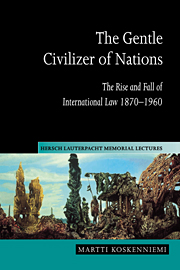Book contents
- Frontmatter
- Contents
- Preface
- List of abbreviations
- Introduction
- 1 “The legal conscience of the civilized world”
- 2 Sovereignty: a gift of civilization: international lawyers and imperialism, 1870–1914
- 3 International law as philosophy: Germany 1871–1933
- 4 International law as sociology: French “solidarism” 1871–1950
- 5 Lauterpacht: the Victorian tradition in international law
- 6 Out of Europe: Carl Schmitt, Hans Morgenthau, and the turn to “international relations”
- Epilogue
- Bibliography
- Index
Introduction
Published online by Cambridge University Press: 06 July 2009
- Frontmatter
- Contents
- Preface
- List of abbreviations
- Introduction
- 1 “The legal conscience of the civilized world”
- 2 Sovereignty: a gift of civilization: international lawyers and imperialism, 1870–1914
- 3 International law as philosophy: Germany 1871–1933
- 4 International law as sociology: French “solidarism” 1871–1950
- 5 Lauterpacht: the Victorian tradition in international law
- 6 Out of Europe: Carl Schmitt, Hans Morgenthau, and the turn to “international relations”
- Epilogue
- Bibliography
- Index
Summary
This book grew out of the Sir Hersch Lauterpacht Memorial Lectures that I gave at the University of Cambridge in the fall of 1998. It is, admittedly, quite a bit longer than those original lectures were, but it is still informed by the same interest. This was to expand upon an article I had written a year earlier on Hersch Lauterpacht himself for the European Journal of International Law and in which I had attempted to cover the same ground I had done in a book ten years earlier, but from an altogether different perspective. In that book I had described international law as a structure of argumentative moves and positions, seeking to provide a complete – even “totalising” – explanation for how international law in its various practical and theoretical modes could simultaneously possess a high degree of formal coherence as well as be substantively indeterminate. The result was a formal–structural analysis of the “conditions of possibility” of international law as an argumentative practice – of the transformational rules that underlay international law as a discourse – that relied much on binary oppositions between arguments and positions and relationships between them. But as perceptive critics pointed out, whatever merits that analysis had, its image of the law remained rather static.
- Type
- Chapter
- Information
- The Gentle Civilizer of NationsThe Rise and Fall of International Law 1870–1960, pp. 1 - 10Publisher: Cambridge University PressPrint publication year: 2001

